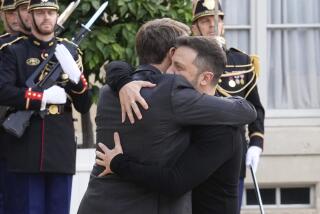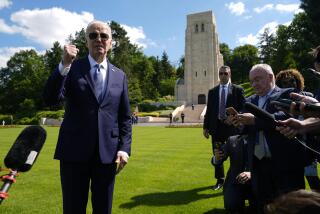Gorbachev Leaves France With Mixed Reviews of Visit
- Share via
PARIS — Soviet Leader Mikhail S. Gorbachev returned to Moscow on Saturday after a four-day visit to France that pointed the way toward serious arms control talks with President Reagan at their November summit in Geneva.
Gorbachev’s first trip to the West since he took office last March, labeled a “Gorbashow” by one skeptical French newspaper, received mixed reviews from Western analysts.
Gorbachev championed detente and unveiled an arms control package that called for an end to Reagan’s “Star Wars” research program for space-based missile defenses and cuts of 50% in each superpower’s nuclear missiles capable of reaching the territory of the other.
“It gained him a propaganda advantage,” one Western diplomat said. “It was very skillful, but there are now some serious things on the table (at the arms control talks in Geneva).”
The French press generally was far more critical of Gorbachev than he probably anticipated. During interviews, Gorbachev was asked repeatedly about human rights issues, including the condition of physicist Andrei D. Sakharov, exiled in the city of Gorky for more than five years.
Gorbachev showed irritation at such questions and adopted the standard Soviet line that human rights are guaranteed in the Soviet Union and are internal matters.
“He came through as a guy who’s very tough and who sticks to a very hard ideological line,” a Western analyst said. “His tone is firm--there were not a lot of smiles.”
Gorbachev clearly achieved one of his objectives during his visit by establishing closer political and economic relations with France. President Francois Mitterrand announced the signing of several agreements, without disclosing their nature.
Mitterrand accepted an invitation to visit the Soviet Union next year, re-establishing the tradition of annual exchanges of visits that began in the 1970s with then-President Valery Giscard d’Estaing but were terminated after the Soviet invasion of Afghanistan in 1979.
After a table-pounding blast at what he called the “political demagoguery” of American officials he didn’t identify, Gorbachev praised Reagan for making a serious response to the new Soviet arms proposal and said that he was “somewhat encouraged” about summit prospects.
“We should not underestimate the seriousness of the American side,” Gorbachev said Friday at a rare news conference.
Gorbachev received some backing from Mitterrand for his opposition to space weapons, but his proposal for separate negotiations to limit the French nuclear force was flatly turned down by Mitterrand. The French leader said that France’s force de frappe was only a bare minimum deterrent that could not be bargained away.
Writing in the leftist daily newspaper Liberation, commentator Carlos de Sa Rego summed up the visit: “The Russian bear laid a trap. The French cock escaped with brio.”
The French and the Russians have historical and cultural ties that help explain why Gorbachev chose Paris for his first trip to the West as Soviet leader.
In the 19th Century, aristocratic Russian families often spoke in French and anti-Communist White Russians chose Paris as a haven after the Bolshevik Revolution of 1917. V.I. Lenin had plotted the uprising from a small apartment in a working district of Paris.
Most observers felt Mitterrand emerged as a clear winner in the Gorbachev visit as far as his stature within France is concerned. In the preceding weeks, his government was reeling from revelations about French secret service involvement in the sinking in New Zealand of the Greenpeace environmental organization’s ship Rainbow Warrior.
Gorbachev’s arrival diverted public attention away from the “Greenpeace affair,” as the French call it, and Mitterrand’s action in standing up to Gorbachev on the issue of negotiating limits on the French nuclear force was widely praised.
In the same week, Mitterrand rejected President Reagan’s invitation to attend a meeting of the seven largest non-Communist industrialized nations in New York in late October, enhancing France’s traditionally independent stance.
Overall, however, it was Gorbachev’s week in what American officials have referred to as his “charm offensive,” which they see aimed at wooing Western European public opinion to put more pressure on Reagan as he prepares for the Geneva summit Nov. 19-20.
More to Read
Sign up for Essential California
The most important California stories and recommendations in your inbox every morning.
You may occasionally receive promotional content from the Los Angeles Times.










